Apr 2019 2nd Edition
Apr 2019 2nd Edition Londekile
Translations
Booysens Court: Did you know?
Booysens Court: Did you know? Ursula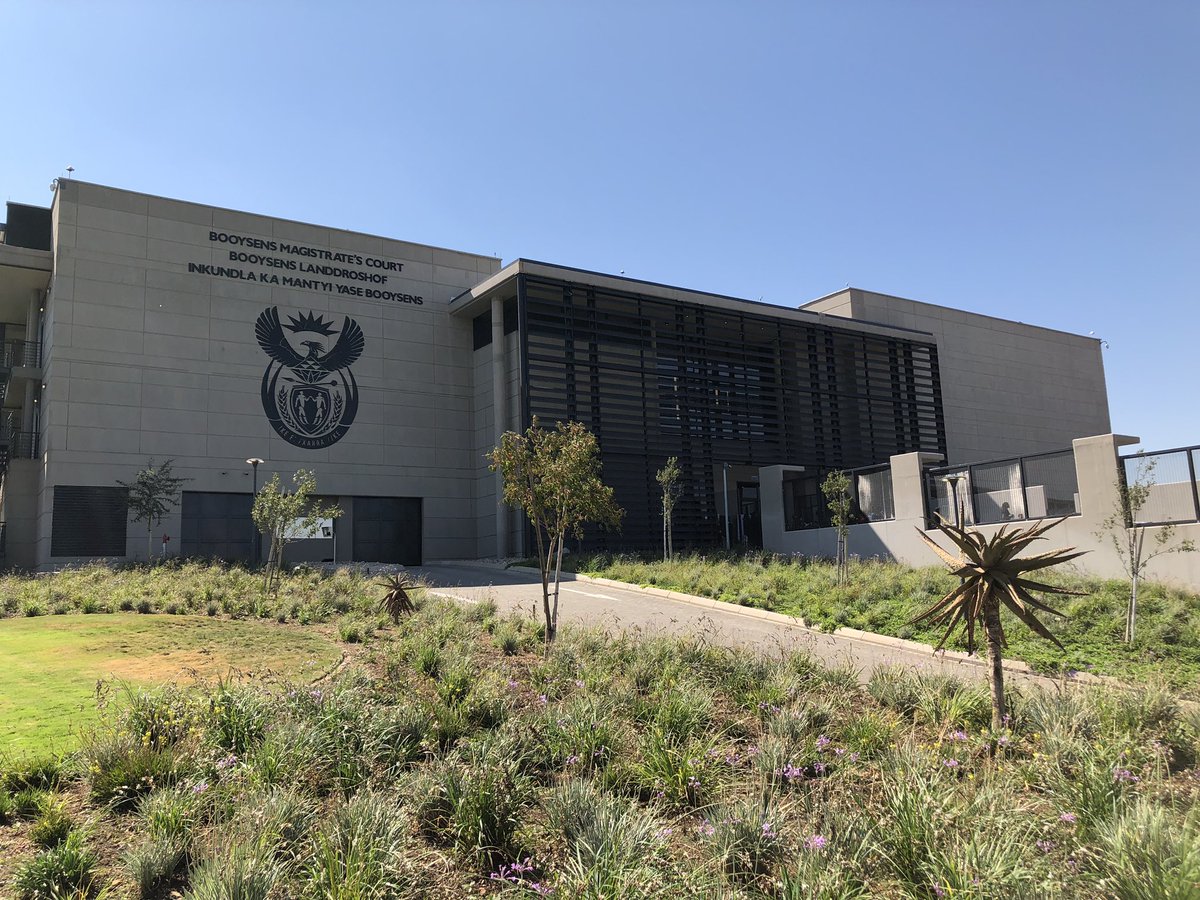
- The Booysens Magistrate's Court built at Oakdene in the south of Johannesburg is making access to justice services more convenient for the community.
- Prior to the construction of the court, communities in this area were serviced by the Johannesburg Central Magistrateís Court, which required them to travel up to 13 kilometres to be assisted.
- The facility was built at a cost of just over R242 million.
What services does the Booysens Magistrateís Court offer?
- Maintenance matters
- Domestic violence matters
- Childrenís Court
- Harassment Court matters
- Civil law services
- Small Claims Court services and criminal law services.
If you are being abused or suspect that someone is being abused call:
- South African Police Service − 10111
- Childline − 0800 055555
- Stop Women Abuse Hotline − 0800 150 150
- Lifeline on 0861 322 322 or (021) 461 1111
What can I do if I am a victim of sexual violence?
Visit a Thuthuzela Care Centre which offers the following services:
- Comfort
- Medical care
- Access to the legal system
- Counselling.
How to contact a Thuthuzela Care Centre in your area?
Contact the GBV Command Centre in your area by calling 0800 428 428 or send a ‘Please call me’ to *120*7867#
Agricultural project brings hope
Agricultural project brings hope LondekileAn agricultural project, run by a group of people living with hearing impairment, is creating jobs for the deaf community in Rand West City Local Municipality.
The Voice Out Deaf Cooperative is one of the five cooperatives found in the Rand West Agri-park, which is one of the agri-parks that have been in full operation for more than two years.
Matebogo Victoria, a member of Voice Out Deaf Cooperative said the aim of the cooperative is to create jobs and employment opportunities for the deaf community.
But overall, she said, the objective of the project is in line with the government agricultural policy of increasing food production and attaining sustainable food security and subsequent poverty reduction.
So far, Voice Out Deaf Cooperative has managed to create about seven jobs.
The cooperative produces tomatoes, green pepper, lettuce and spinach.
“The popular vegetables will become available throughout the year at affordable prices,” she said.
Victoria said there were many advantages of using the state-of-the-art agricultural facility to grow vegetables. This includes irrigation facilities, effective time for production, modern machinery like tractors that are used up in farming to make ploughing and harvesting faster, and it helps to yield high-quantity of crops.
The cooperative sells its products to the local fruit and veg market, street vendors and local residents.
Victoria said when the cooperative started two years ago it was difficult to access the market.
“Access to market is no longer a problem. Instead, we have more market than what we produce,” she said.
However, she acknowledged that it is generally difficult for people living with hearing impairment to do business as many customers struggle to communicate with them.
“Compared to people who are hearing, the deaf population faces notable challenges in finding jobs as well,” she added.
She said the cooperative plans to improve the quality of food produced in South Africa in future, and to offer horticultural training for farmers in the Rand West.
Building a better SA with social partners
Building a better SA with social partners UrsulaReligious organisations can play a vital role in developing the communities of South Africa.
President Cyril Ramaphosa has called on government and its social partners to strengthen their working relationship to address backlogs in the provision of school and health infrastructure.
Speaking at the opening of Marobathota High School and Evelyn Lekganyane Clinic in Polokwane, Limpopo recently, the President said backlogs in public infrastructure impact negatively on children’s basic rights to a decent basic education and to health, safety and dignity within educational facilities. 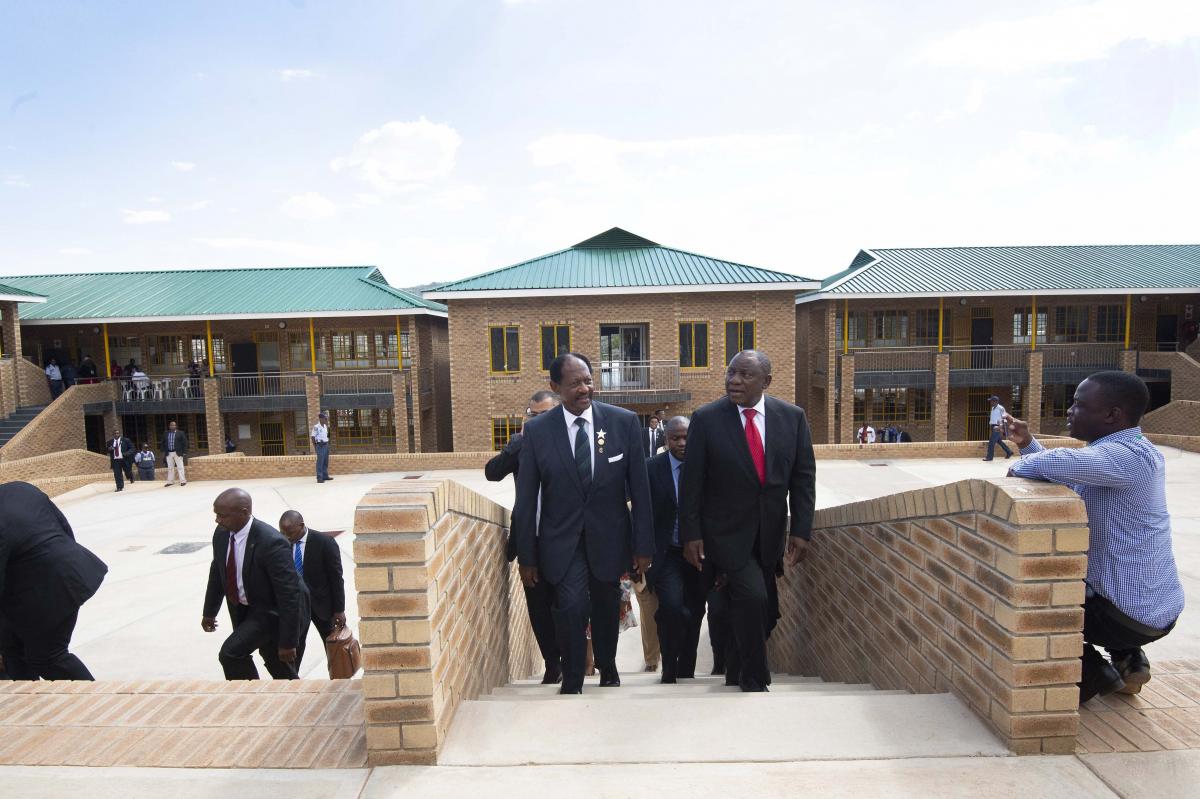
“They impact on the right of our people to access health- care services and in the most severe cases, on their right to life and dignity.
The refurbished and extended facilities of the Marobathota High School and Evelyn Lekganyane Clinic were funded by the Zion Christian Church, led by Bishop Barnabas Lekganyane.
“The work that has been undertaken here at Marobathota High School forms part of a broader national effort to build a positive school environment.
He defined a positive school environment as one that has appropriate facilities, well-managed classrooms, available school-based health support, and a clear, fair disciplinary policy.
President Ramaphosa said government is committed to using schools as vehicles for promoting access to a range of public services among learners in areas such as health, poverty alleviation, psychosocial support, sport and culture.
“We are working with the private sector and development partners to eradicate pit latrines and other inappropriate sanitation facilities in all our schools within the next three years.
“Our experience tells us that school infrastructure is the foundation but effective learning requires a comprehensive approach that addresses not only all aspects of the teaching and learning experience, but also the social conditions under which learners live,” the President said.
The President said safety in schools cannot be overemphasised.
''We need to work together as school communities to end the scourge of violence in our schools.
“This starts in our homes, on our streets, in our community centres, in our churches, mosques, synagogues and temples.”
He thanked faith-based leaders for their role in addressing some of the challenges schools face.
Bulk buying to give entrepreneurs the edge
Bulk buying to give entrepreneurs the edge LondekileA new programme for small businesses is set to transform the grassroots economy and empower citizens in KwaZulu-Natal (KZN).
Business owners in Mandeni are set to prosper, thanks to a government-sponsored bulk-buying programme.
Small-scale business owners in the KZN town said the opening of the warehouse means they will save money and grow their businesses. Phethubukhosi Xaba who owns BM Tuckshop said the KZN Bulk Buying and Warehousing Programme will be good for his business.
“It will be great for us as local business owners as it will mean we can get more things at cheaper prices,” Xaba said.
Spaza shop owners will buy from the Ithala Bank-owned warehouse at a cheaper price than they would at a wholesale store, said Xaba.
“The warehouse will help us as it’s not about making money, but rather assisting small business people to grow our businesses,” the businessman said.
The owner of Siyakhula Store, Selo Dlamini, said the warehouse is the best thing to happen for their businesses. “Because the warehouse will sell things at a cheaper price and is located closer to us, we will save. I will no longer have to go all the way to Stanger to stock up. I will just call the warehouse and give them my account number and they will deduct their payment, then they will deliver my order to my business,” he told Vuk’uzenzele.
Dlamini said: “My customers will be the biggest beneficiaries as I will be able to sell things at a cheaper price.”
Speaking at the launch, KZN MEC for Economic Development, Tourism and Environmental Affairs, Sihle Zikalala, said the programme will open opportunities for businesses that have suffered from high prices by wholesalers.
"Bulk buying is the ultimate solution to township traders who, for years now, have been denied access to goods at affordable prices. Traders will now order, using the latest paperless technology, from a state-of-the-art warehouse in Mandeni, and have their goods delivered at no cost to their shops,” Zikalala said.
Small businesses’ representative organisation, the National African Federated Chamber of Commerce and Industry, echoed Zikalala’s sentiments.
Computer training boosts digital literacy in townships
Computer training boosts digital literacy in townships LondekileAfter dreaming big, an IT entrepreneur is now enabling others’ dreams to come true.
Over 10 years ago, Luvuyo Rani started a small business selling computers from the boot of his car in Khayelitsha, Cape Town. Today, his company Silulo Ulutho Technologies employs over 200 people and has equipped thousands of township residents in the Eastern and Western Cape with essential computer skills.
Rani was a commerce teacher in Cape Town when the Department of Basic Education first started outcome-based education which encouraged teachers to use computers to assist children. He started selling computers and then opened an internet café, but he saw that there was a need for training too.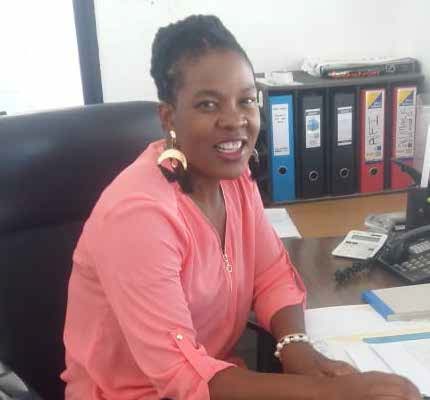
“There was little if any digital knowledge in the townships. Most people struggled to get employed because they lacked computer literacy. So we started offering basic skills and computer training for them,” said Rani.
“Silulo teaches the community – old and young – that it is possible to enrich yourselves and start your business and get a job. We also ensure that it is affordable; this makes the dreams of the community reachable,” he said.
Thanks to her studies through Silulo, Sakile Nyoni worked her way up from being a domestic worker to being employed as a stock controller at a company in Cape Town. Nyoni grew up in Zimbabwe before moving to South Africa in 2005. She spent 12 years earning a small salary before she found work as a receptionist.
“I realised then that I knew nothing about computers and so I couldn’t do my job properly. I discovered Silulo and did my computer course with them,” says Nyoni.
Nyoni built up her computer skills and then decided to do a business administration course. She was promoted to stock controller in 2018.
“I cannot thank Silulo enough for what they have done for me. I never thought that I would be sitting here in my own office, with my own computer. Silulo’s support is amazing, from the way they teach in the classroom to allowing students who struggle with finances to pay when they can afford it.”
Rani urges people to never think that they are stuck somewhere with no way out. “You just need to work hard and find opportunities – you will get to where you want to be one day!”
Egg business makes waves in the EC
Egg business makes waves in the EC angenithaMthatha brothers have taken an initial start-up loan from their mother and turned it into a thriving egg-producing business, despite both being in their early 20s.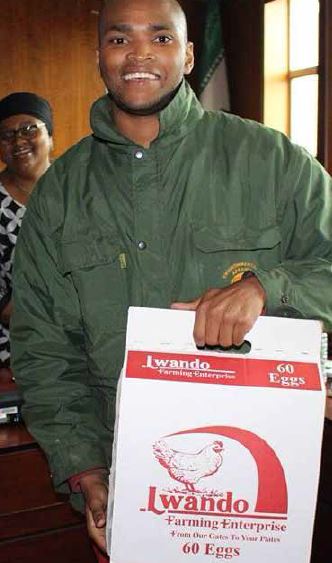
Two brothers are set on dominating the egg industry in the Eastern Cape.
At the tender ages of 21 and 25 respectively, Lilitha and Khanya Bam, who own Lwando Farming Enterprise, supply between 80 and 100 trays of 60 eggs each to Spar Nicks Foods in King William's Town each week.
Khanya said they are looking to expand their operation so they can supply 300 trays of 60 eggs each.
“We started the business selling eggs at social grant pay points and it grew to the point that we started supplying a local retail store.”
The eggs are produced at their chicken farm which they started with a family loan at Mekeni village in Ngqamakhwe. Khanya told Vuk’uzenzele that they borrowed R40 000 from their mother and used it to buy 100 hens, bags of feed and other necessities. The business currently has 1 100 hens.
The brothers aim to become the biggest black-owned egg producers in the province. “We want to inspire black kids to show that this is possible,” he said.
The business is seeing a steady growth, which the Bam brothers attribute to savvy marketing tactics, an understanding of the sector and a passion for the industry. “We are getting a lot of people through our social media pages,” said Khanya, who is an Agricultural Sciences graduate.
When the brothers started their business, they struggled to secure land but eventually a one-hectare plot was donated to them by their local chief.
Khanya said the most important thing in the industry is to work hard and never stop learning. “If you want to be in the agricultural business, especially poultry, you must learn to be patient, have a lot of passion and be prepared to get your hands dirty.”
From the Union Buildings: Celebrating 25 years of freedom
From the Union Buildings: Celebrating 25 years of freedom Ursula The year 2019 is a very special time for South Africa. It is the year in which we reflect on the journey of the last 25 years since the attainment of our hard-won freedom and democracy.
The year 2019 is a very special time for South Africa. It is the year in which we reflect on the journey of the last 25 years since the attainment of our hard-won freedom and democracy.
We will remember the relief and exhilaration of the day of our freedom, the historic and defining moment at which we became a country at peace with itself and the world.
As we mark this incredible milestone, whose attainment we share with the international community which stood by the oppressed majority, we should all work towards sustaining the momentum to build a society in which all South Africans enjoy their rights to life, dignity and freedom.
We must use this time to reflect on the progress we have made as a forward-looking nation that is united in its diversity. We cannot forget the challenges we have encountered, the setbacks we have suffered, and the mistakes we have made and are learning from, with the aim of never repeating them.
Twenty-five years is an occasion for us to celebrate the triumph of freedom and democracy over racial subjugation and tyranny; and the triumph of hope over despair.
Ours was a hard-won freedom. A generation of people suffered untold hardships and made many sacrifices in their commitment to build a South Africa that belongs to all who live in it.
Freedom comes with the responsibility to choose what is right or wrong, complemented by the unwavering commitment to move the country forward.
A year ago, we set out on a path of growth and renewal after emerging from a period of uncertainty and a loss of confidence. This period put a strain on our democracy and freedom, and sought to divide us as South Africans.
One of the threats to our hard-earned freedom is corruption, which must be rooted out whenever it manifests itself in our society and organisations.
We must work together to cure our country of the corrosive effects of corruption and restore the integrity of our institutions.
Let us advance the values of our Constitution and once again place at the centre of our national agenda the needs of the poor, unemployed, marginalised and dispossessed.
To address the dire situation at several of our state-owned enterprises – which have been crippled by gross mismanagement and corruption which severely undermine their effectiveness – government has implemented decisive measures to improve their governance, strengthen leadership and restore stability.
We have since intervened to stabilise and restore the credibility of institutions such as the National Prosecuting Authority, South African Revenue Service, State Security Agency and South African Police Service. We are also dealing with the effects of state capture on public institutions.
The commissions of inquiry are performing commendably, often under challenging circumstances, to uncover the truth.
Soon after these commissions make their findings and recommendations in line with their mandates, the criminal justice system will be expected to act on the evidence of criminal activities, without fear or favour.
The action we take today to end corruption and hold those responsible to account will determine the pace and path of the radical socio-economic transformation we seek to achieve.
We recognise, as do all South Africans, that our greatest efforts to end poverty, unemployment and inequality will be meaningless unless we tackle corruption in all its manifestations and in all areas of public life.
Corruption has no place in South Africa and all people need to act decisively to end this dishonest and fraudulent conduct by anonymously calling the National Anti-Corruption Hotline: 0800 701 701.
Ending corruption and living in a country which upholds the rule of law and respects the Constitution is in our hands. As a peace-loving nation, we should condemn attacks on foreign nationals, which are an act of pure criminality. South Africa belongs to all who live in it.
In the 2019 State of the Nation Address, I highlighted the need to improve literacy levels of our country and to create a reading nation.
To date we have launched the National Reading Coalition – a body where ideas can be developed and implemented to address the national reading challenge.
Further to this, on 23 April, on World Book Day, government will be launching a reading App. I hope that you will all use the App and share the books that you and your children are reading.
I would like to call on parents to start improving reading capabilities in their homes by taking 30 minutes a day to read out loud to their children.
Meanwhile, make your voice heard by casting your vote on 8 May during the general election.
Let us work together to build a South Africa where all people live together in peace and harmony.
Ga-Rankuwa Industrial Park creates jobs for locals
Ga-Rankuwa Industrial Park creates jobs for locals LondekileIndustrial parks are being developed around the country to kick-start growth and development.
The Department of Trade and Industry (the dti) has invested R28 million into revitalising the Ga-Rankuwa Industrial Park, which is set to attract new investors and create jobs for local residents.
The first phase of the project included the installation of 8.5km of fencing, boom gates, swing gates, pedestrian gates and the installation of guardhouses including services, toilets and electrical work, closed-circuit television, the refurbishment of high mast lights and paving.
The industrial park has approximately 283 developed units; 210 are fully occupied by manufacturing and commercial businesses while 73 are available for leasing.
The services of 17 small, medium and micro-sized enterprises (SMMEs) and five women-owned companies were used during the refurbishment.
According to Trade and Industry Minister Rob Davies, the main objective of the industrial parks programme is to accelerate economic growth, diversify economic activity, attract investment, create jobs and address inequality.
The programme is also aimed at supporting job creation in the manufacturing and related sectors.
“The industrial parks are recognised as catalysts for broader economic and industrial development in their host regions. To date, seven industrial parks have already been launched: Babelegi in Gauteng, Isithebe in KwaZulu-Natal, Phuthaditjhaba and Botshabelo in the Free State, Vulindlela and Komani in the Eastern Cape, and Seshego in Limpopo,” said Minister Davies.
So far, R511 million has been invested in revitalising these parks.
The Minister said the dti has forged strategic partnerships for the implementation of the programme on a national scale, working with the provinces, their agencies as well as municipalities.
“In the case of Ga-Rankuwa, the dti is working with the North West Development Corporation, which owns the park. The City of Tshwane has also played a vital role in ensuring the smooth implementation of the programme,” said Minister Davies.
One of the companies currently operating in the industrial park is GRE Industries, which manufactures car parts for the automotive industry and other products for the mining industry.
The chief executive officer of the company, Elton Marshall, told Vuk’uzenzele that the company has close to 200 employees, most of whom are from Ga-Rankuwa.
Marshall said employing local residents is a win-win situation because employees can just walk to work and do not spend their salaries on transport.
Hobby turns into a ‘meaty’ business
Hobby turns into a ‘meaty’ business angenithaThe meat his dad gave him to make biltong as a reward for his help as a youngster inspired a Free State entrepreneur into starting his own business.
What was once a hobby has turned into a livelihood for 29-year-old Serasengoe Moodie.
Making biltong from the meat of animals hunted by his father was once a fun sideline for the young entrepreneur but today he has turned this former interest into a profitable agro-processing business called Amity Development Solutions.
Based in Thaba Nchu near Bloemfontein in the Free State. The company has its own cattle, and produces biltong and other meat products.
“My father used to go hunting and upon return I would assist him with handling the meat that was from his hunting trip. He would reward me with a few kilograms of meat and tell me to make biltong for myself. I sold some of it to my friends and made a few rands for myself,” he explained.
As time went by, Moodie decided turn his hobby into a business.
“When the business started, I was just selling biltong, but it is starting to grow and I now supply clients with other meat products, including wors and mince. I also have my own livestock,” he explained.
He received a business grant of R100 000 from the Department of Economic, Small Business Development, Tourism and Environmental Affairs in 2018 and bought butchery equipment.
He also won a R10 000 business voucher from the National Youth Development Agency in the same year and used it to buy a meat dryer.
The support from government has helped to improve his business and he is now able to meet clients’ demands quicker than before.
Although the business is still in its infancy, Moodie has managed to employ two people on a permanent basis and also has a few temporary workers for busy periods.
His home kitchen doubles as a butchery and meat-drying business for now but he hopes for his own business space in the future.
Improving the country’s education
Improving the country’s education angenithaAn initiative led by TeachSA is placing graduates in schools to address the shortage of mathematics, science and language teachers.
The programme has seen marked improvements in participating rural schools. Gabisile Gasa, who teaches English and Life Orientation at Umthawelanga Senior Secondary School in the rural town of Maclear in the Eastern Cape, said her pupils have started using a previously abandoned library.
Gasa said when she arrived at the school there were varying challenges which, with the help of pupils, she has addressed. “When I arrived there was a library that was not used as well as an office space. I worked with various learners from my Grade 10 English class to clean the library. Learners from different grades are now able to use the library,” she said.
The Bachelor of Psychology and Postgraduate Certificate in Education, senior phase and Further Education and Training qualification holder, said among the successes she has seen since joining the programme two years ago is the development of a debating society where pupils participate in a debating tournament organised by the local municipality.
“I’m also using the office space to run a mentorship programme with learners to assist them in dealing with various challenges they might be facing at school or home, as well as career-related orientation.
“I have realised that learners need someone who will show them empathy, be non-judgmental and willing to work with them. There have been instances where learners
who were engaged in
gangsterism had the opportunity to see there is more to life after various mentorship programmes and support,” she said.
Another graduate who is making a positive impact is Diepsloot-based Bongane Mohale. The Master of Arts student is in his third year as a member of TeachSA.
Mohale who taught English at the school said he had a positive impact at Ntswane Secondary School in Hamanskraal where he was previously based.
“I ensured that learners got a chance to play sports and got the opportunity to go on educational trips. The school matric results changed drastically, moving from around 68 percent to 90.4 percent,” he
said.
Did you know?
The TeachSA programme has since 2009 recruited and trained 810 ambassadors, with 566 already placed in low-resourced schools.
Mooi River weavers craft a brighter future
Mooi River weavers craft a brighter future angenithaWith skilful hands and creative ideas, members of a KZN cooperative are creating marketable crafts that supplement their income and making a success of it despite their disabilities.
group of people living with disabilities in the KwaZulu-Natal Midlands are succeeding as entrepreneurs.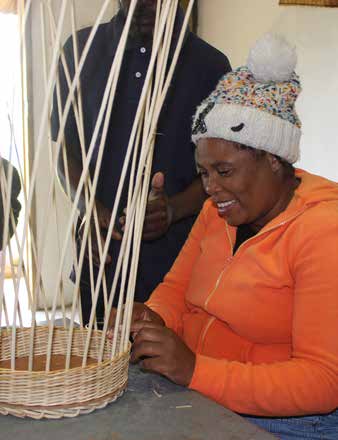
The 15-member cooperative, called Shiyase Disabled Crafts, produces hand-made crafts, with cane being the main material they use.
The cooperative, which is led by Muzi Mayaba, creates a range of products from litter bins to small heart-shaped containers and even cane furniture. Started in 1999, the cooperative sells its creations for profit which is shared among its members. This income supplements their social grants.
“We sell to people here in the area, at the Royal Show in Pietermaritzburg and in some big stores in Pietermaritzburg… Our prices vary based on what you are buying. A small jewellery basket costs R30 but a big and more complicated creation can cost as much as R7 000,” said Mayaba.
He said they also fix tatty or broken cane products. “People bring their broken chairs and we restore them to their former glory,” he said.
Bonginkosi Sithole said he learnt weaving at a government-sponsored training programme. The cooperative has also received support from several government departments, including the departments of Social Development, Arts and Culture and Environmental Affairs, and received
R46 000 in funding from the National Development Agency.
Sithole said the baskets they make are of good quality and can last for the longest time.
Fellow crafter Lindiwe Mchunu had just finished weaving an office litter bin, which took two days to complete, when Vuk’uzenzele visited.
The Mooi River-based cooperative would love a bigger workshop and even a small retail space.
“We wish to grow and see ourselves working from a bigger space as we now are working in one room and all share the small table you see here. We also wish we could get help in opening our own store,” said Mayaba, who uses crutches to get around.
“We wish to grow and see ourselves working from a bigger space.”
Netball Cup to open opportunities for women
Netball Cup to open opportunities for women angenithaSouth Africa's win to host the 2023 Netball World Cup could inspire more girls to take part in the sport.
Netball is underdeveloped in schools around South Africa, and this landmark event is expected to empower girls to get into the sport.
It is the first time that the largest women's sporting event in the world will be hosted on African soil. Cape Town was awarded the title of host city after a team comprising the city, Netball South Africa (NSA) and national and provincial government, presented a successful bid to the International Netball Federation.
“A lot of hard work and intense preparation from all spheres of government went into the bid to present what Cape Town has to offer. It was a team effort which showcased our world-class facilities and infrastructure, as well as our expertise in hosting major international events,” said Cape Town Mayoral Committee Member for Safety and Security JP Smith.
The tournament will have direct economic impacts through visitor and organiser spend create jobs and will help promote women’s sport.
“It will inspire young women to break through the norms of society and traditional roles. This will empower them to follow their dreams. It will create social cohesion and infuse the city and nation with netball’s positive values,” said Blanche de le Guerre, the chief executive of NSA.
The biggest part of NSA’s preparations for the World Cup will be in its domestic development programme.
“The key part of the NSA domestic development programme from now until 2023 is a focus on ‘Taking Netball Back to the People’. The programme will include a number of areas, including improving key age group categories through new events and competitions.”
De le Guerre identified current South African netball captain Bongiwe Msomi as a perfect example of how netball can change the lives of young girls, no matter their background. Msomi (31) grew up in an impoverished household in Hammarsdale with seven brothers and sisters.
“She started with nothing and netball empowered her and gave her so many opportunities in life. When you are at training or playing on court you are all equal, it is then not important how poor or how rich your parents are,” said De le Guerre.
New clinic for Hammanskraal residents
New clinic for Hammanskraal residents angenithaResidents of Hammanskraal in the north of Pretoria say the new state-of-the-art clinic that recently opened in their community will help to address their health challenges.
Kekana Gardens Clinic was officially opened by Gauteng Premier David Makhura.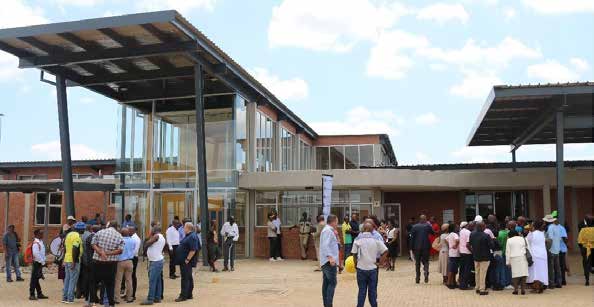
The state-of-the-art health facility cost the provincial government about R7.2 million to build and its construction took just over two years.
Mike Makhubela is one of the residents who attended the official opening. He was happy to have a clinic just a walking distance from his doorstep.
“I am excited about this clinic. It is closer to our homes so we will not have to spend money to travel just to access health services anymore. It is our responsibility as the community of Hammanskraal to protect it against vandalism,” he said.
Another resident, Mpho Mokoena, pleaded with fellow community members to never think about vandalising the clinic even during service delivery protests.
His fellow resident Tshepo Kganyago said: “I am happy about this new clinic because it is big and that means we can get a variety of services that we did not get previously. I think it will address health challenges in the area.”
Speaking to community members during the opening ceremony, Premier Makhura said Kekana Gardens Clinic will go a long way in alleviating the plight of the people in the area.
“For years, the community of Hammanskraal had to access health services from a small clinic and constantly complained that it was always congested because of long queues,” said the Premier.
Amongst dignitaries who attended the opening ceremony was Gauteng Health MEC Gwen Ramokgopa, Education MEC Panyaza Lesufi and Infrastructure MEC Jacob Mamabolo.
MEC Ramokgopa said the Department of Health will not only provide medication to residents when they need it but also offer world-class facilities.
She added that the new clinic will use digital technology and will be energy efficient.
George Moeketsi is the Senior Communication Officer of GCIS in the Gauteng Provincial Office.
No more long queues for KZN’s elderly patients
No more long queues for KZN’s elderly patients LondekileThanks to an innovative programme that sees chronic medication being dispensed at community points closer to homes, the elderly no longer spend long, painful hours in queues at clinics and hospitals.
Eighty-year-old Alpheus Goba said that thanks to the Central Chronic Medication Dispensing and Distribution (CCMDD) programme, he no longer spends endless hours queuing for his gout medication. Instead, he now fetches his medicine at his local church.
“I fetch my medication at the local Methodist Church, which is a 15-minute walk from my home. It takes me about 40 minutes to make the trip in total, which gives me more than enough time to get to my household chores too,” said the Umlazi resident.
Speaking from his home in the V-section of Durban’s Umlazi township, Goba ssaid before the launch of the programme, he would spend the whole day, and sometimes even the following day, at Prince Mshiyeni Hospital.
Instead of having to consult the doctor with every visit, he now goes to the doctor once every six months and fetches his medication weekly at the church. The retiree not only fetches his own medicine but also that of three other family members, including his 101-year-old mother-in-law.
Goba, whose arm was amputated after being burnt in a fire, said as a person living with a disability, he is grateful for the convenience of the system, explaining that when he gets to the church, the family’s medication is already set aside for him.
“The people at the church already know when I will be arriving. They know I am very punctual,” he said.
The provincial Department of Health’s CCMDD programme aims to decentralise the distribution of chronic medication to prevent the elderly from having to stand in long queues at hospitals and clinics.
The programme allows chronically ill elderly people to collect their medicines at community collection points such as chemists.
If you want to collect your medication using the CCMDD programme and are based in KwaZulu-Natal you can call 0800 070 070 or send a Please call me to 073 161 7102
Oncology unit brings cancer treatment to rural areas
Oncology unit brings cancer treatment to rural areas angenithaInnovation and empathy for her patients has resulted in an oncologist in the Eastern Cape bringing treatment closer for cancer sufferers.
A need to help the poor led to the opening of the first oncology ward in Mthatha, Eastern Cape.
Based at the Nelson Mandela Academic Hospital, the ward services people from the town and surrounding areas. Oncologist Dr Zuki Jafta said she saw the need to open the ward after witnessing the suffering of patients from as far as Lukikisiki who had to travel for about four days just to get treatment in East London. 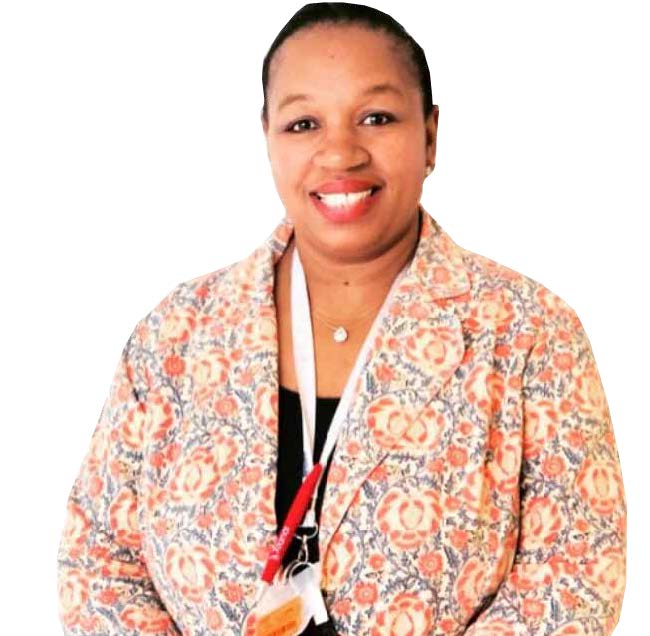
The patients would spend the night sleeping in chairs at the Mthatha-based hospital before being transported in patient transport vehicles to the Frere Hospital in East London.
“When I was hired [as an oncologist at Nelson Mandela Academic Hospital] my mission was to reduce the number of patients who were travelling to East London’s Frere Hospital.”
Before patients are sent to Frere Hospital, she looks at their files to determine if they could instead be treated in Mthatha.
“The treatment we are providing for the patients in Mthatha means that a large number of the patients don’t have to go for treatment in East London. The ones who do travel go there for radiology treatment,” she said.
After seeing the suffering of patients, Dr Jafta asked for permission and converted an old caravan park in the hospital into a place where patients could sleep overnight while they awaited transportation to Frere Hospital.
“This has changed things drastically as about 60 people were travelling to Frere Hospital in East London per day,” said Dr Jafta. The initiative means that instead of 50 patients a month, she sees around 550 patients per month.
“We have started information drives in order to educate people about cancer,” she said, explaining that this has resulted in the earlier detection of cancer.
The hardworking doctor, who still sees patients at Frere Hospital, wants to see a radiology machine at Nelson Mandela Academic Hospital which will help reduce the number of transferred patients in need of early-detection radiology treatment.
Remembering Solomon Mahlangu
Remembering Solomon Mahlangu Londekile“My blood will nourish the tree that will bear the fruits of freedom. Tell my people that I love them. They must continue the fight”
 The journey towards South Africa’s freedom and democracy tells a story of youngster committed to the fight against apartheid - Solomon Mahlangu, a fearless revolutionary who was executed 40 years ago under the brutal apartheid regime.
The journey towards South Africa’s freedom and democracy tells a story of youngster committed to the fight against apartheid - Solomon Mahlangu, a fearless revolutionary who was executed 40 years ago under the brutal apartheid regime.
Just before his hanging on 6 April 1979 Mahlangu, affectionately known as Kalushi, uttered these infamous words to his mother, “My blood will nourish the tree that will bear the fruits of freedom. Tell my people that I love them. They must continue the fight.”
Mahlangu was born in Pretoria on 10 July 1956. He joined the African National Congress (ANC) in September 1976 and left the country to be trained as an uMkhonto weSizwe soldier in Angola and Mozambique. He returned to South Africa on 11 June 1977, to assist with student protests.
On 13 June 1977 Mahlangu and his companions, Mondy Motloung and George Mahlangu, were accosted by police in Goch Street, Johannesburg. Two civilians were killed and another two were injured in the gun battle and Kalushi and Motloung were arrested.
Even though Mahlangu was not responsible for the killings, he was found guilty and sentenced to death by hanging on 2 March 1978 and executed at the Pretoria Central Prison on 6 April 1979.
In fear of crowd reaction at the funeral, the police buried Mahlangu in Atteridgeville. He was moved to the Mamelodi Cemetery on 6 April 1993.
In 1993 Solomon Mahlangu Square, in Mamelodi, was dedicated to his memory and the ANC hailed him as hero of the revolutionary struggle in South Africa. In 2005, he was awarded the Order of Mendi for Bravery in Gold, for bravery and sacrificing his life for freedom and democracy in South Africa.
In 2014 the National Youth Development Agency (NYDA) established the Solomon Kalushi Mahlangu Scholarship Fund (SKMSF) to embrace Kalushi as a symbol of bravery.
“Mahlangu wanted to become a teacher. Thus, preserving his legacy through the provision of free education to students from poor and working-class backgrounds became prudent.
The NYDA has successfully run this programme for the past five years,” said the NYDA’s Executive Chairman Sifiso Mtsweni at a media briefing with the Department of Arts and Culture.
SA lends a hand in Cyclone Idai
SA lends a hand in Cyclone Idai angenithaCyclone Idai was the most devastating cyclone to strike Mozambique in modern history. After developing in the Mozambique Channel, the cyclone rapidly headed for land, striking the Beira region in mid-March and heading westwards.
By the end of March, severe flooding and high winds had claimed the lives of over 700 people, with officials expecting to find more bodies as the flood waters begin to subside. 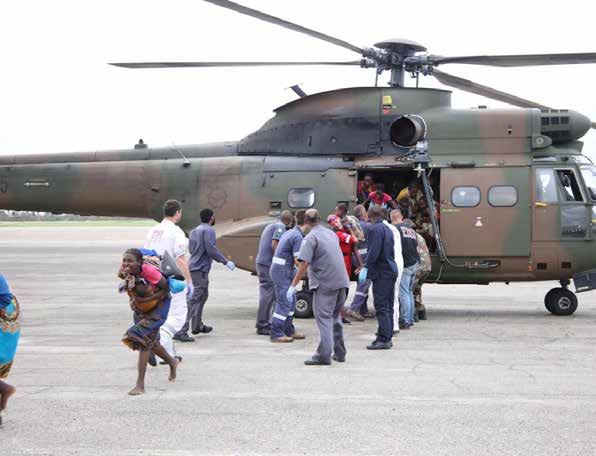
Nearly 91 000 houses were destroyed, damaged or flooded, while around
128 000 affected people have had to find shelter in 154 sites.
South Africa responds immediately
As with the similarly devastating floods in 2000, South Africa’s government responded immediately to the crisis faced by Mozambique – an impoverished country without sufficient resources to effectively manage the situation.
President Cyril Ramaphosa authorised the deployment of multi-departmental rescue teams for Malawi, Mozambique and Zimbabwe. The teams consist of members of the South African National Defence Force (SANDF), the South African Police Service (SAPS) and the Department of Health.
A total of 82 personnel, including SANDF members, healthcare workers and environmentalists, are providing disaster relief in Mozambique. Along with cargo planes carrying life-saving supplies, three helicopters were deployed to assist with search–and–rescue efforts for the thousands of people stranded on islands and rooftops surrounded by the raging flood waters.
In total, the SANDF and SAPS have rescued more than 400 people.
“Using its air platforms, the SANDF has been engaged in multilateral efforts to provide life-saving and sustenance supplies to areas cut-off by the devastating cyclone, which overran entire villages, creating temporary lakes and islands in the process,” the SANDF said in a statement.
South African individuals, businesses and non-governmental organisations (NGOs) also stepped in to provide millions of rands worth of donations in food, medicine and other supplies, which were delivered to the country by International Relations and Cooperation Minister Lindiwe Sisulu.
“South African companies have responded to the call. Some are on the ground in Beira, together with the SANDF. The South African Government would like to thank NGOs and United Nations humanitarian organisations who responded immediately after the cyclone hit,” said Minister Sisulu.
Government is implementing its humanitarian relief efforts in partnership with Gift of the Givers and the World Food Programme.
Government has committed R60 million to Mozambique from the South African Renaisssance Fund, for rebuilding and agriculture.
A further R10 million has been committed from the South African Humanitarian Fund for immediate relief.
Battling the threat of disease
Apart from causing immediate loss of life and leaving hundreds of people still missing, the flooding is already causing a rise in cases of cholera and malaria.
“It is inevitable that cases of cholera and malaria will arise. In many areas we are already fighting with malaria cases. The government is already setting up a cholera treatment centre to mitigate cholera. We should not be frightened when cholera issues arise,” said Mozambique’s Land Minister Celso Correia.
In response to the situation, the World Health Organisation dispatched 900 000 doses of cholera vaccine to the affected areas.
Assistance for Zimbabwe and Malawi
Humanitarian SANDF teams have also been dispatched to Malawi and Zimbabwe, where weather systems linked with the cyclone have claimed dozens more lives and left thousands homeless or stranded.
In Malawi, the death toll from the floods stood at over 100, with a further 83 000 people displaced.
“A team of 10 military health practitioners with search and rescue air assets were dispatched to Malawi. Front elements were also deployed to Mozambique to assess the situation with the view to assist on the ground for humanitarian purposes,” the SANDF said in a statement.
A further R5 million has been committed by the South African Government for immediate humanitarian aid in Malawi.
In Zimbabwe, where additional South African relief teams are working, the death toll from Cyclone Idai has risen to 200, with dozens more people still missing. South Africa has contributed R10 million for immediate relief efforts, and a further R50 million for rebuilding and construction.
Comparison with floods of 2000
In early 2000, five weeks of heavy rainfall caused catastrophic flooding that killed approximately 700 people – the highest death toll experienced in floods in Mozambique for 50 years.
South Africa also played a crucial role in humanitarian relief efforts during the 2000 floods. The most touching story from the disaster was that of Rosita Mabuiango, whose mother gave birth to her on a tree while stranded above swirling flood waters before the family was rescued by a SANDF helicopter.
“South African companies have responded to the call. Some are on the ground in Beira, together with the SANDF.”
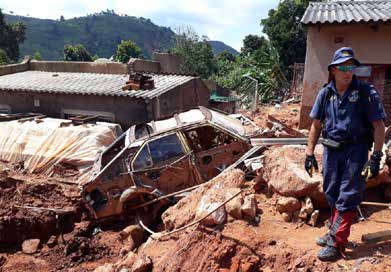
SALB turns 100
SALB turns 100 LondekileThe South African Library for the blind (SALB) is a concrete example of government’s dedication to equality and human dignity for all.
The SALB, the only library servicing blind and visually impaired people in Southern Africa, recently celebrated its centenary.
The 100-year-old non-profit organisation celebrated in style by launching its own book - SALB, A Dairy of the Library.
The book is the library’s first internal publication and it seeks to commemorate and celebrate the history of the library since its inception.
From humble beginnings
The SALB was born in the then tiny Eastern Cape township of Grahamstown, during the height of the 1918 global influenza pandemic.
While nursing local influenza victims, Josephine (Josie) Wood met Miss Comber, a British nurse who wished to establish religious study groups for the blind. By the time Miss Comber was recalled to England she already had 100 Braille volumes. It was then that she convinced Wood to develop an accessible library for the visually impaired.
Wood’s acceptance marked the beginning of the SALB. She established a small library in a room in her house in 1919. By 1923, a Library Committee was appointed, which gave the library its official status; and by 1930, it had paid off the bond on a building grant from the Carnegie Corporation of New York. In 1949, it received its first talking book machines from overseas and in 1968 it was declared as a ‘cultural institution’.
“The library’s growth has been tremendous. We now have mini libraries in each province to service local communities with a primary focus on providing equal access to information, in accessible formats, that improves blind and visually impaired people’s quality of life at no cost to them,” said SALB Director Francois Hendrikz.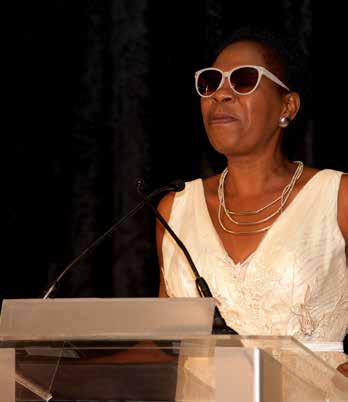
“The library falls under the Department of Arts and Culture and we would like to acknowledge the impact that the department has made on these people’s lives,” he added.
History made
Dr William Rowland, chairperson of the SALB, said that the organisation’s book has made history as it was launched in Braille, and in audio and electronic formats simultaneously.
“As a member of the SALB, having joined when I was eight years old, I can speak on behalf of fellow blind people when I say that the library has been active in making the words of Helen Keller true. She said that the wonder of Braille is to touch words and to be touched back by them.”
SALB changes lives
Bele Netshineni, who has been a member of the library since 2014, said it has had a huge positive impact on her life. “I was not born blind. I was a teacher for 22 years, prior to becoming blind five years ago. I suddenly felt stuck. I felt my life was over. I soon realised that I needed to redesign my life. The library has gone above my expectations in that it is assisting me with my studies. I am studying towards my master’s degree, which I thought was a dream that would probably never come true,” said Netshineni.
“I am very grateful to the library’s staff, who were patient with me before I relearnt how to use a computer, for example. I never for a second thought I could be normal again. Due to the hard work that the library has put into making access to information easy for me, I can now grow. May the library continue making other lives as meaningful as they have made mine,” she added.
Volunteers honoured
Audio narrators, transcribers, copy typists and proofreaders who volunteer their time at the library were honoured as part of the centenary celebration.
“Without the volunteers we would not have over 42 365 audio titles (8 473 unique titles) and 26 164 Braille titles (4 314 unique titles). It is truly an honour to work with the team of people who assist us to service our members,” said Hendrikz.
Did you know?
- SALB houses five Braille newspapers one of which is Vukíuzenzele newspaper.
- Vukíuzenzele newspaper distributes about 1 200 copies of Braille across the country every month.
Small businesses get connected
Small businesses get connected angenithaGovernment is helping small businesses tap into the many procurement opportunities available to them from the State and its entities as well as big business.
Government is taking further steps to support small businesses, with the launch of an online trading platform that will link these businesses to opportunities from large South African companies. 
President Cyril Ramaphosa launched BLSA Connect in March. He also launched the South African SME Fund, which aims to finance and scale-up black small, medium and micro enterprises. Fifty of South Africa’s largest companies have invested R1.4 billion in the SA SME Fund, much of which will be invested into black emerging businesses.
President Ramaphosa said that this was part of government’s ongoing commitment to place small businesses at the heart of South Africa’s economic growth.
The National Development Plan highlights that small businesses can create up to 80 percent of South Africa’s growth and create 90 percent of the jobs we need by 2030.
But the President said that small businesses often struggle to survive because of a lack of access to opportunities.
“Too often we hear stories of young people with brilliant business ideas who never succeed simply because there is no one in their immediate social circle with the necessary experience to guide them or sufficient contacts to give them opportunities.”
The BLSA Connect platform allows small businesses to register for free and gain access to a range of benefits.
Businesses can create a profile on the site to promote their company, making them more visible to corporate buyers. There is also a resource centre that gives valuable advice on areas such as submitting tenders. The site offers an online search for national, provincial and regional contracts that are available, increasing the chance of finding procurement opportunities.
Free notifications of all relevant opportunities in a sector of your choice can also be provided through the Contract Alert service.
The exciting development adds to the many other steps government has taken to boost the small business sector in South Africa. One of these is the establishment of a R2.1 billion SMME and Innovation Fund that will support start-ups with a reasonable chance of success.
Small business owners who want to become part of BLSA Connect can register for free at https://blsaconnect.com/register/.
For more information, call 011 356 4650.
Steering the accounting sector to success
Steering the accounting sector to success LondekileShe was recently appointed as the CEO of the Finance and Accounting Services Sector Education and Training Authority (Fasset), which is one of the 21 SETAs that were established in terms of the Skills Development Act to cover all sectors in South Africa, including government.
Fasset is mainly responsible for skills development in the finance and accountancy services sector.
“This job is more of a social project for me. It allows me to give back to society. I want to produce as many young ‘Ayandas’ as possible, because if it was not for this institution’s bursary initiative I would not be here,” she added.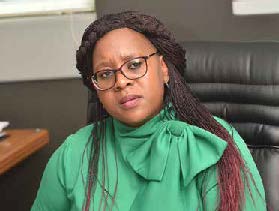
Part of her responsibilities is to make sure that the SETA realises its vision of facilitating the achievement of world-class finance and accountancy skills in South Africa, as well as to increase the flow of new finance and accountancy entrants to the market.
Fasset produces Chartered Accountants (CA), accounting and finance professionals, as well as auditors across the spectrum.
Having worked as a CA for 16 years, Mafuleka has taken it upon herself to help the country produce as many black professionals in this sector as possible.
“No child with good grades should be out of university on the basis that they cannot afford fees,” she said.
Mafuleka said Fasset mainly targets students from previously disadvantaged communities, whose parents cannot afford to pay for tertiary education fees and who do not qualify for National Student Financial Aid Scheme funding.
Fasset has various funding programmes that cover young people from high school level until they are employed.
She said the youth programmes cover learners from high school level, starting from Grade 8 to 12, and focus on subjects like mathematics to help them perform better and to get ready for tertiary education.
“We also give bursaries to university and Technical and Vocational Education and Training college students up to postgraduate level, and after they have graduated, we help them get placed for employment through internships and learnerships,” she said.
To get more information about Fasset, send an email to fassetcallcentre@fasset.org.za or call 011 476 8570.
Steps to curb women abuse
Steps to curb women abuse UrsulaPresident Cyril Ramaphosa has reiterated that women abuse has no place in South Africa.
“It should also have no place in our homes, at places of work, churches, schools and on the streets of our townships, on the pathways of our villages and also in our cities and towns,” President Ramaphosa said.
He was speaking at the official opening of Booysens Magistrate’s Court and the signing of the Gender-Based Violence and Femicide (GBVF) Declaration in Johannesburg recently.
The state-of-the-art Booysens Magistrate's Court comprises 10 courts, including four district courts, Civil Court, Family Court, Children’s Court, Small Claims Court, as well as two regional courts for criminal and sexual offences.
The declaration, on the other hand, is borne out of the National GBV and Femicide Summit, held in November 2018, in an effort to find solutions to GBV and femicide.
Addressing stakeholders and members of civil society, President Ramaphosa said that the summit opened the eyes and ears, and even the hearts, of many people to the gravity and impact of GBV in the country.
“We have heard the pleas of survivors of GBV to be treated with respect by our criminal justice system. In opening this new Sexual Offences Court in Booysens, we are affirming the right of the women and girls of this country to be treated with professionalism and empathy.
“The opening of the court and the declaration against GBV and femicide are two of the measures we have put in place since the Presidential Summit convened in November last year,” President Ramaphosa said.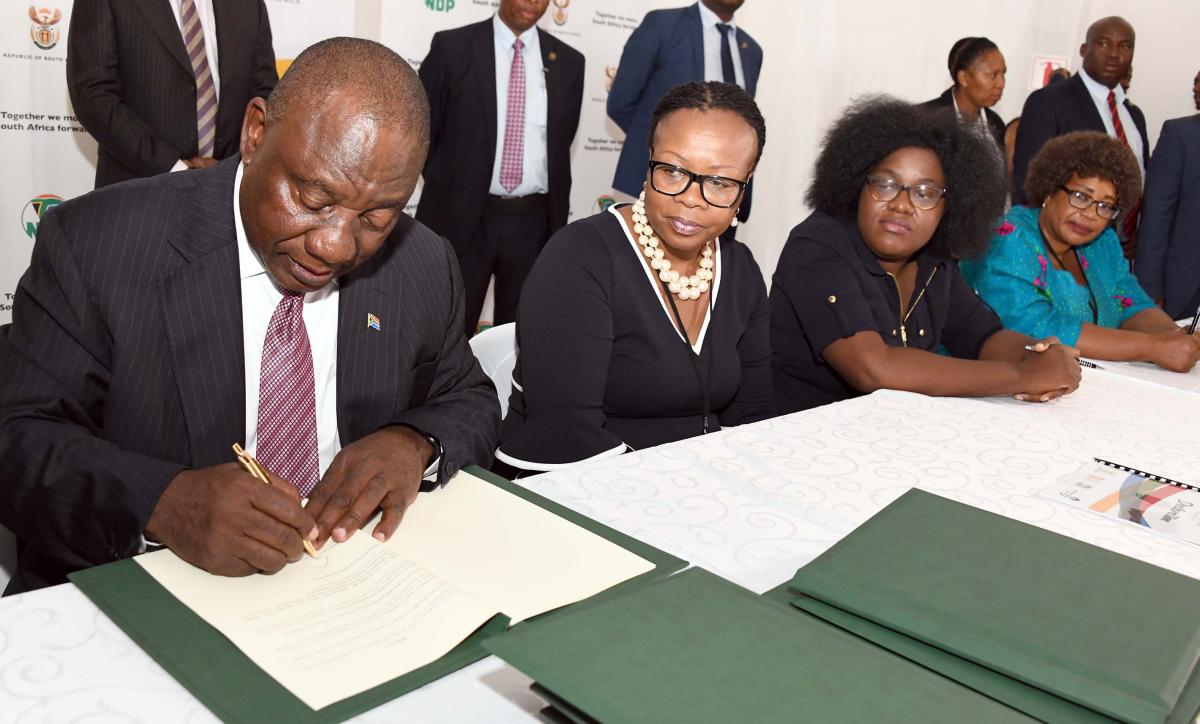
As a nation, the President said South Africa is making a bold and unequivocal declaration that “we will not yield to GBV”.
“We will not allow it to steadily consume our people, to erode our dreams of a stable and peaceful society in which all have equal rights and opportunities, regardless of their race, gender, sexual orientation or the circumstances of their birth.
“In signing this declaration against GBV and femicide, we are saying as a collective, that the cancer of women abuse has no place whatsoever in our homes, communities, churches, schools, streets and our villages, towns and cities,” the President said.
The Minister of Women Bathabile Dlamini said the South African Constitution places huge emphasis on non-sexism. She said this must be aligned with programmes that fight GBV.
Minister Dlamini called for the proper training of all people working in the justice system and that they should be sensitised to respect women.
Students set to be free from historic debt
Students set to be free from historic debt Ursula The provision of money to pay for historical debt is a welcome relief for the National Student Financial Aid Scheme (NSFAS) funded university students. The Department of Higher Education and Training has allocated R967 million for the payment of fees for students owing ‘historical debt’.
The provision of money to pay for historical debt is a welcome relief for the National Student Financial Aid Scheme (NSFAS) funded university students. The Department of Higher Education and Training has allocated R967 million for the payment of fees for students owing ‘historical debt’.
The department said the money would assist students who owed fees from the previous year.
Advanced Certificate in Public Administration student Abongile Mbonja said the money will help pay her debt of R37 000.
Mbonja says she owes the University of Fort Hare money for her 2018 fees.
“The money will help me since I will be able to register all my modules. With the debt I accumulated I would not have been able to register a particular module for the second semester so this will help me continue with my studies,” she said.
The 26 year-old student said the funding has come at the right time. “I will be able to graduate for my higher certificate in September. The announcement has helped offload the burden that I carried. I can now focus on my studies.”
Higher Education and Training Minister Naledi Pandor announced that her department will fund 52 514 students who qualify for the funding scheme.
The department’s spokesperson Lunga Ngqengelele said in a statement: “The allocation is specifically for those who had been funded on the previous funding scheme of the NSFAS prior to the significantly improved funding support that began in 2018.”
Ngqengelele said the students who will benefit are those who were “required to fund part of their costs through family or own funding and were not able to do so.”
He said that the historic debt refers to money owed to the university by continuing
NSFAS qualifying senior students who were registered in the 2018 academic year and were funded by NSFAS.
The students are those who come from families with an income threshold of R122 000 per year.
Mbonja said the funding will ensure that she graduates with a bachelor’s degree in two years’ time. She said the announcement has created excited among her fellow students.
Take your fresh produce to the global market
Take your fresh produce to the global market angenithaSouth Africans who run businesses in the fresh produce sector will be given an opportunity to showcase their products at the Fruit Logistica in Berlin, Germany next year.
This opportunity is made possible by the Department of Trade and Industry (dti). The department has called on businesses in the fresh produce sector to apply to participate at the Fruit Logistica in 2020.
Fruit Logistica is the world’s largest trade fair with about 3 200 exhibitors and 78 000 trade visitors from across the globe attending every year. The entire spectrum of the fresh fruit and vegetable sector meet there for business and investment opportunities.
The dti will provide successful applicants with exhibition space and booth rental costs, freight-forwarding of displaying materials, air travel assistance up to R17 000 for SMMEs and black-owned enterprises only, and a daily subsistence allowance of
R3 000 per day.
According to the Fruit Logistica website, this trade fair gives small and medium-sized companies and organisations from all over the world a platform to realise their full business potential within the international fresh produce trade, and to write their own success story.
The platform also provides a complete picture of the latest innovations, products and services at every link in the international supply chain.
It offers networking and contact opportunities to the key decision-makers in every sector of the industry.
The list of fresh products listed on the Fruit Logistica website includes fresh fruits and vegetables, nuts, dried fruit, fresh convenience products, fresh herbs, sprouts, spices, flowers, plants, organic products, fair trade products and frozen fruits and vegetables.
How to apply
The deadline for the submission of application forms is 5 September 2019, and the event is scheduled to take place from 5 to 7 February 2020.
Application forms and guidelines can be accessed on the department’s website www.thedti.gov.za
For enquiries regarding the application process contact Tshepiso Malunga on TMalunga@thedti.gov.za or call 012 394 3284.
Understanding autism
Understanding autism Ursula For parents with children with autism, the disorder causes confusion, frustration and embarrassment. Many parents are not aware of the disorder or what they can do to help their children lead ‘normal’ lives.
For parents with children with autism, the disorder causes confusion, frustration and embarrassment. Many parents are not aware of the disorder or what they can do to help their children lead ‘normal’ lives.
What is autism?
Autism is a neurological disorder that occurs from birth and often starts presenting symptoms in the first few years of a child’s life.
Steve Biko Academic Hospital clinical psychologist Julia Mathabhate, explains that autistic children experience the world very differently to others.
“They have difficulty communicating and interacting with others. They also have different sensory symptoms; they may smell, see or hear things differently to other people. They may behave aggressively, throw tantrums or injure themselves,” says Mathabhate.
Parents can find it extremely challenging to deal with this behaviour, especially when it happens in public.
How can parents help children with autism?
Mathabhate says that much of the focus in treating autism is getting parents to understand how their children experience life.
“Parents really have to try and put themselves in their child’s shoes. They have to find the best ways to communicate either verbally or non-verbally with their children and understand what signs the child is showing. For example, if a child has had a tantrum, you need to identify what caused it and then change behaviour to best fit the child’s needs.”
Mathabhate says that it is important for parents to seek help as soon as they notice any issues with their child.
“When a child is diagnosed with autism early on, the chances of improvements in the condition are much higher. Three percent of children who are diagnosed with autism between the ages of two and four will go on to completely lose the diagnosis. By the time the child reaches the ages of seven to 11, there will be huge differences and the child may be able to lead a much more normal life.”
Where can parents take their children for treatment?
Mathabhate says in many cases, autism cannot be fully cured, but it can be managed effectively. She adds that teachers have a crucial role to play in identifying problems with children at school, and suggest a referral to a psychologist.
For more information and advice about autism, parents can contact Autism South Africa on 011 484 9909.
Workplace doors opened for rural students
Workplace doors opened for rural students angenithaYoung unemployed youth from rural areas now have a greater chance of finding employment, thanks to a woman-owned business that was funded by the National Youth Development Agency (NYDA).
Malitinne is a job placement company that focuses on finding employment for students from rural areas and mainly from Technical and Vocational Education and Training (TVET) colleges. Owner Sibusisiwe Kraai said she started the business after noticing how rural youth who had studied at universities of technology and TVET colleges were struggling to find internships and in-service training opportunities.
Malitinne received NYDA grant funding valued at R49 820. In addition, Kraai said the agency refers young people who are looking for in-service opportunities to her company.
“We place graduates and undergraduates in workplaces for in-service training. We approach TVET colleges, universities and private training providers to see if we can assist their learners in securing placements,” she said.
Some of the TVET colleges that Kraai’s company works with are Umfolozi in Richard's Bay, Esayidi in Port Shepston and UMgungundlovu in Pietermaritzburg. The company also draws talent from the Mangosuthu University of Technology, the University of Johannesburg and Walter Sisulu University, among others.
Since starting Malitinne five years ago, Kraai said they have managed to place over 9 000 students in jobs in KwaZulu-Natal, the Eastern Cape and Gauteng. She is looking to expand her business to other provinces.
“Of these, I can safely say we have achieved 36 percent permanent employment.”
Kraai herself had struggled to find an in-service training placement for eight months, after completing the academic part of her diploma in Local Government and Development Management at Mancosa.
During her time at Edinvest Holdings, which worked with local municipalities in KwaZulu-Natal, Kraai realised how much rural youth battled to find work experience opportunities. This reminded her of her own struggles and she decided to do something about it.
She said: “We recruit from the deepest rural areas because it’s those learners who are suffering the most. You find that academically they are very good but when it comes to expressing themselves during interviews, they are very scared.”
Today, Kraai holds a Bachelor of Commerce in Accounting degree from the Regent Business School and aims to expand Malitinne’s operations after receiving accreditation to train students for national certificates in furniture making, clothing and textile design, and forestry.
Youth who are looking for help from the NYDA can call 0800 52 52 52
or send an email to info@nyda.gov.za.
Young mother leads autism awareness drive
Young mother leads autism awareness drive Ursula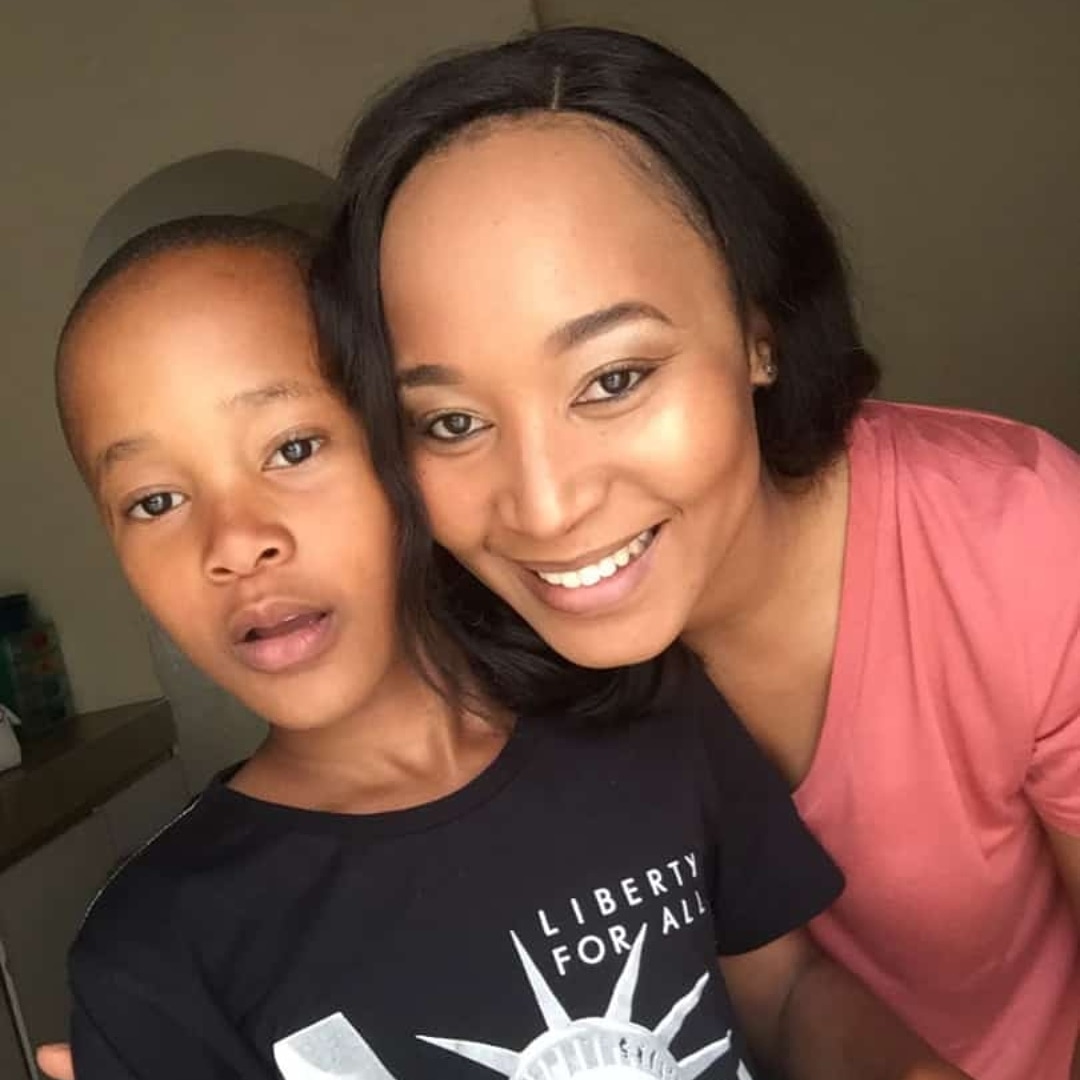 Letlhodilwe Moroe, from Bloemfontein in the Free State, is raising awareness about autism in her community.
Letlhodilwe Moroe, from Bloemfontein in the Free State, is raising awareness about autism in her community.
As a mother of an 11-year old autistic boy she took it upon herself to open a non-profit organization, Tokologo Place of Hope, which raises awareness, provides information and supports parents who have autistic children.
Moroe believes that there is little understanding about autism among parents who have autistic children, especially those living in townships and rural areas.
Autism is a developmental disorder which is characterised by difficulty in communicating, forming relationships with other people and using language.
Through her organization, Moroe helps child-headed households and families of children with autism with access to disability grants, medication and therapy.
“Autism is a challenge and it takes a lot from a parent. Once a parent accepts that their child is autistic this makes life better for the child.”
Moroe said her life as she knew it stopped when she found out that her son was autistic.
“Everything changed, I could not work and schools and therapy for my son were expensive.”
Seeking a better opportunity for her son, Moroe moved to Gauteng to find schools that specialise in autism, as the Free State has none.
“In the Free State there are schools for children with disabilities, but they only take up to eight children in class and there is a long waiting list.”
Even with the challenges before her, Moroe said having an autistic child has been a blessing.
“My son’s condition has given me a lot of strength and taught me patience. He is very gifted and he loves gadgets. He is very good with technology.”
It is the little achievements that Moroe celebrates in her son’s development.
“My son is at a better and happier place now, he is learning to talk, potty-trained and I can cut his hair while he is awake.”
Moroe dreams of opening a centre for autism in the Free State one day.